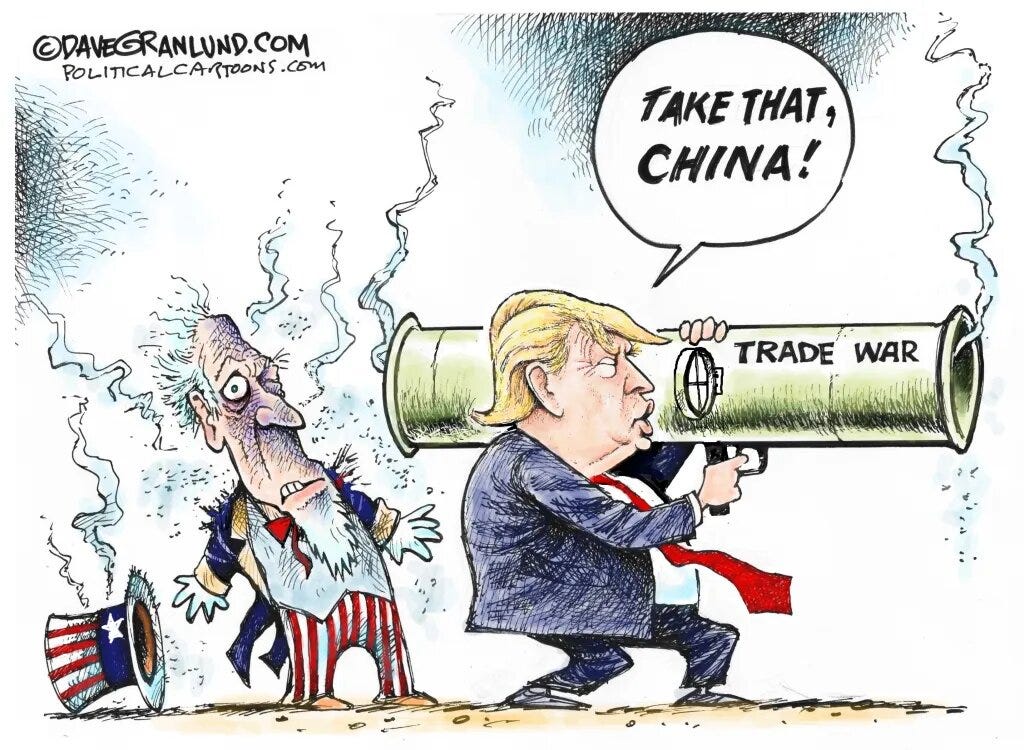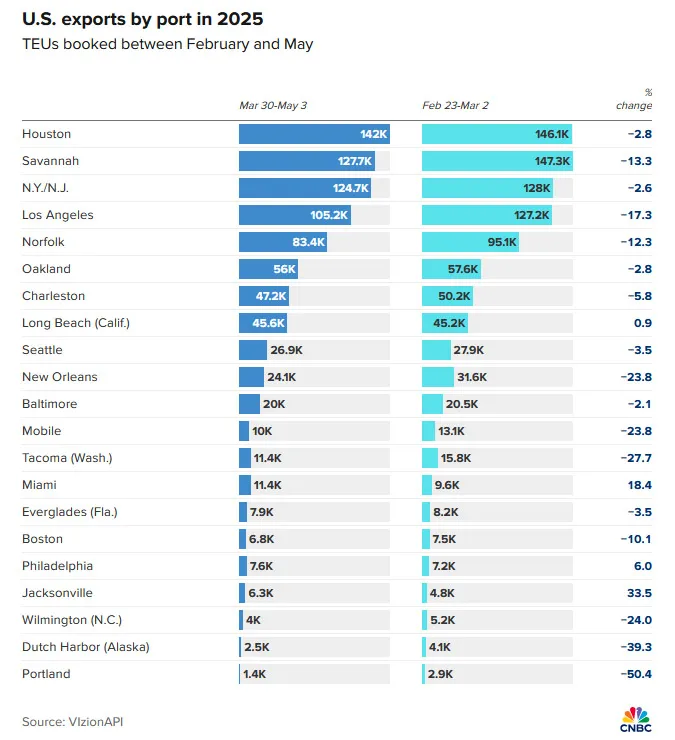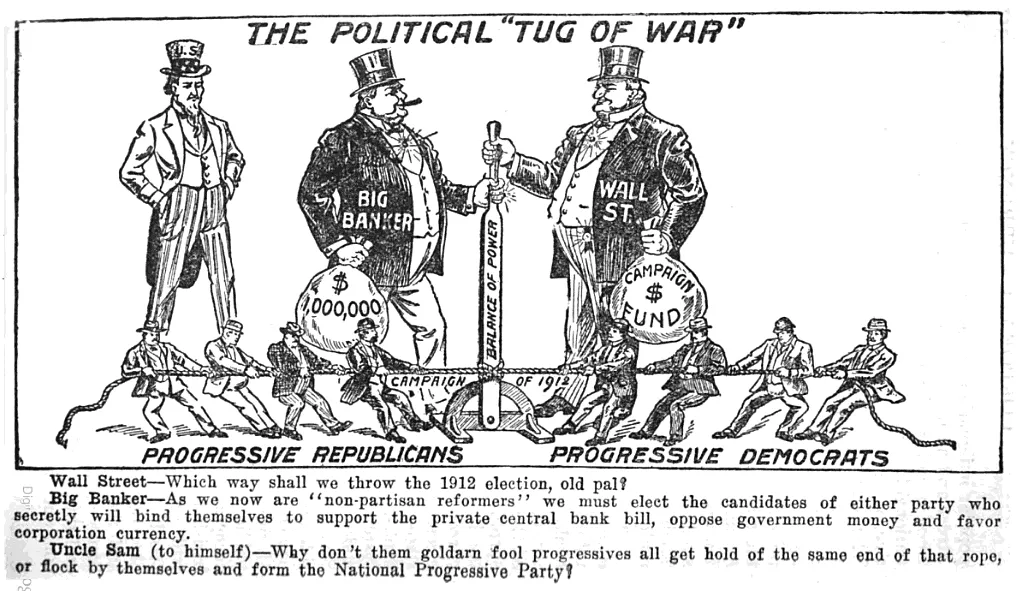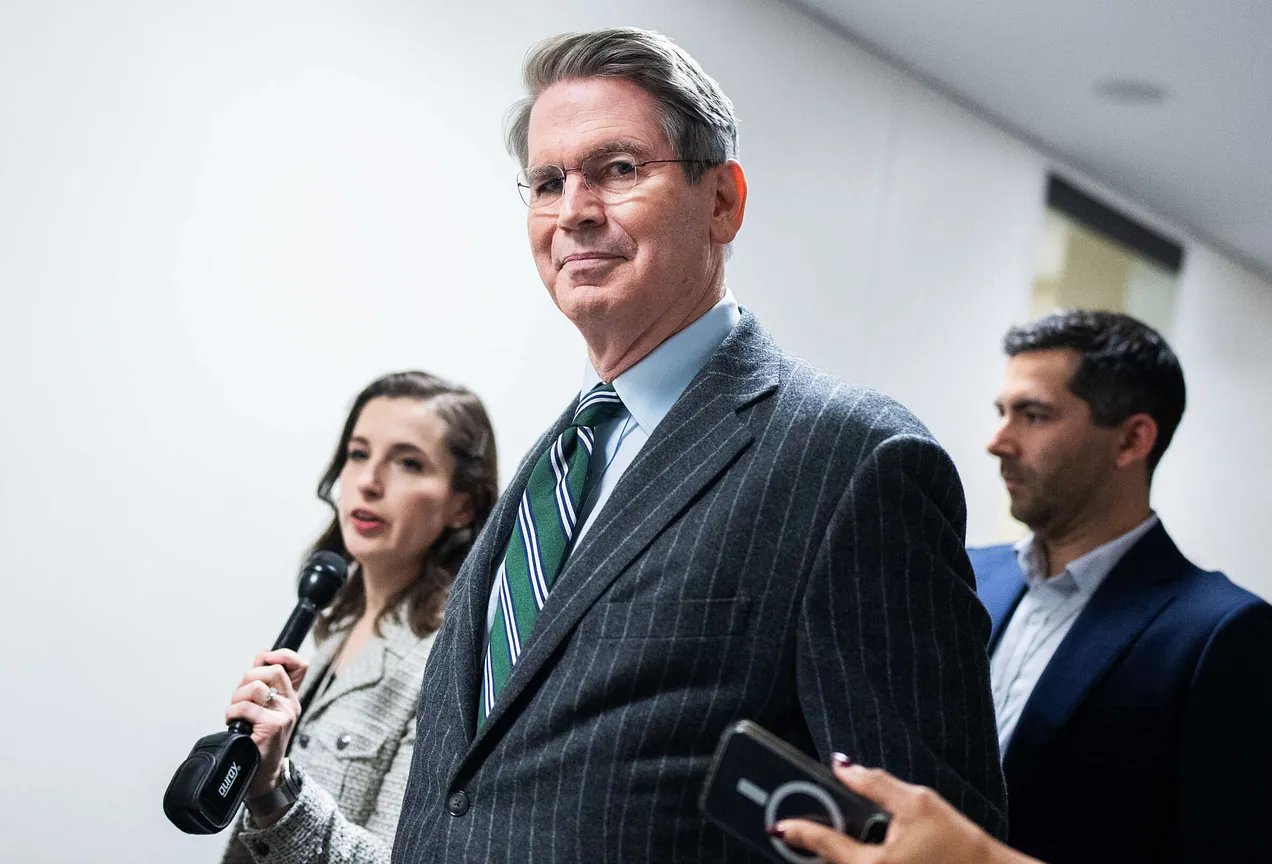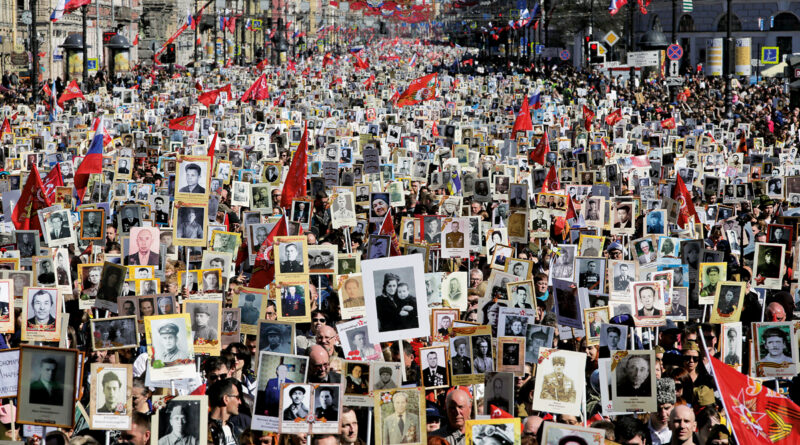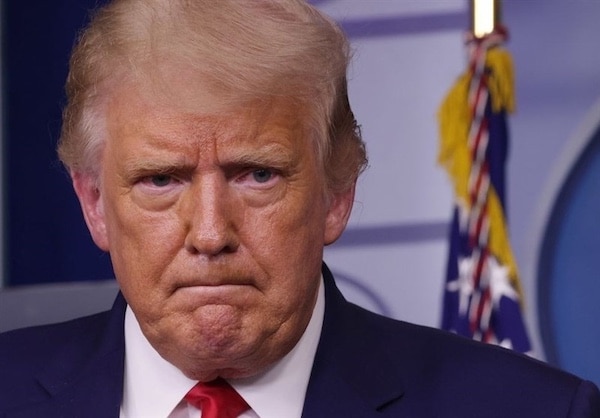Chinese writer Yan Mo
Karl Sanchez
May 01, 2025
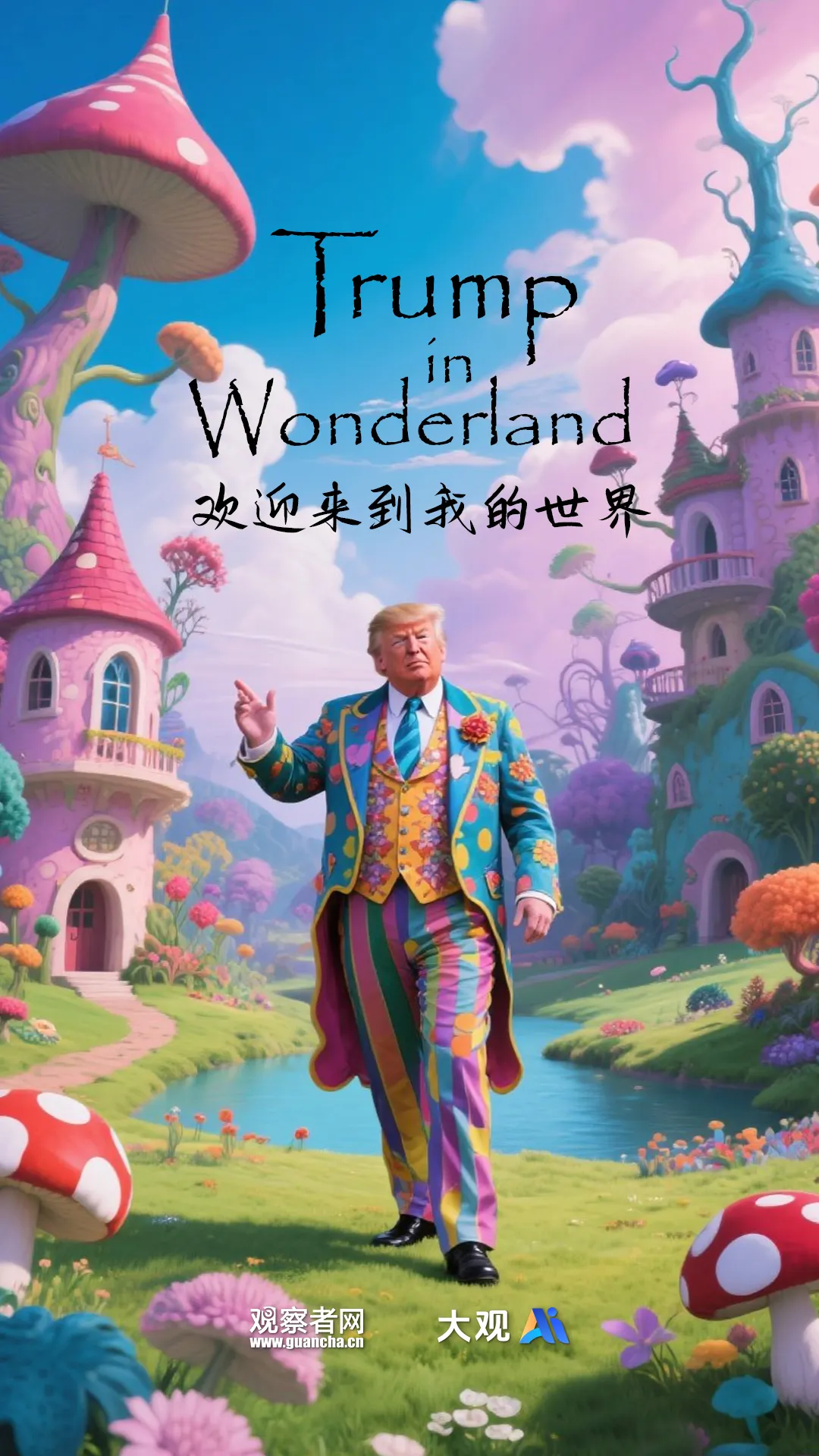
Pepe Escobar initially pointed to this great essay whose content is clear from the title. Eventually, Trump’s behavior is compared to some of China’s past Emperors whose actual doings aren’t critical to know as the context provides enough information. And yes, as with Lewis Carrol’s two books about Alice and her Wonderland, there’s plenty of humor and “gee you know he’s right” moments. Today’s chat between Nima, and Drs. Hudson and Wolff also discussed the many oddities of Trump’s behavior that fit rather well with the prose that follows.
I must applaud Yan Mo’s imagination and intellect go construct this tale straddling fantasy and reality. One point Yan fails to mention is the fact that Trump’s Outlaw US Empire is on its downward slope and isn’t nearly as strong as it was even during Trump’s first term. Trying to entice more into the military while drastically mauling the Veterans Administration—almost 100,000 jobs and vital programs axed so far—is but one example of Trump’s rabbit hole policies. As many are pointing out, there’s no certainty at all with anything, so rational planning can’t be done. Some push-back is happening, but the public must realize that the Ds are merely Trump-lite and serve the same interests, which aren’t the general publics. The mid-term elections are 1.5 years away, and a great deal of damage can and will be done before the opportunity to change the Congressional chemistry arrives. That it takes a Chinese writer to inform Americans about Trump’s genuine nature is also a shame.It has only been 100 days since Trump took office, and it seems that 10 years have passed, the United States has changed the world, and we have fallen into the "rabbit hole".
The rabbit hole of Alice in Wonderland is now described as falling into a bizarre world. There is nothing better for the world than a rabbit hole to account for what happened in 100 days. In the rabbit hole, truth and its opposite can be truth at the same time. In the days to come, there will be many interesting things.
Trump's character, first and foremost, the white rabbit in a vest and a pocket watch, hurriedly leads the curious us down the rabbit hole. Then he became Humpty Dumpty, arrogantly saying, "When I use a word, it means what I choose, no more, no less".
He said that the trade deficit between China and the United States is one trillion US dollars, which means one trillion US dollars, no more, no less. He said again, TSMC has increased its capital by 300 billion, which means 300 billion, no more, no less. He also said that the Panama Canal is American, and now it has been "recovered", which means that the United States has been recovered, no more, no less.
Mr. Eggman uses a lot of data and words, the meaning of which is the meaning of his choice, and has nothing to do with the original meaning of the word and the real data, which is our first bizarre experience in the rabbit hole.
On the first day of his inauguration, Trump announced that he would impose 25% tariffs on his neighbors Canada and Mexico, and Canada and Mexico could not believe it, especially the Canadian people, who could not accept that their close neighbors would wield the tariff stick against them, and the US-Mexico-Canada agreement was like a piece of waste paper. It was as if they had walked up to a big mushroom and were coldly thrown by the caterpillar with a philosophical question: "Who are you?" "Are you...... I am...... You and I ...... Who am I? Where am I? A bunch of inexplicable question marks hung on the Canadian's forehead.
On his second day in office, Trump signed an executive order confirming that there are only two genders. American teenagers with 97 genders are confused, and Trump now plays the moral duchess and says to teenagers—never imagine yourself different from what others see you are, or you will not be what others think you should be.
On the ninth day of his inauguration, Trump reformed the federal employment system, a large number of civil servants were furloughed and fired, and people who had lost their livelihood asked Trump's Cheshire cat: Please tell me, where do I go? The Cheshire Cat said that it was all the same, no problem, as long as you went far enough, you would definitely get somewhere.
On the 25th day of his inauguration, Trump met with Indian Prime Minister Narendra Modi, who came with a big gift of lowering tariffs and buying more fossil fuels and armaments, and asked Trump the same question: Tell me, where do I go? The Cheshire Cat always replied that if you go far enough, you will definitely get somewhere. I don't know if Modi had an epiphany, but in the rabbit hole, there is no answer to the question, and the answer is made up of one question after another.
On the 40th day of his inauguration, Trump met with Ukrainian President Volodymyr Zelensky at the White House, and he now plays the Queen of Hearts, threatening to cut off people's heads at every turn. The Queen said to Zelensky, you have no cards in your hand! Only then did Zelensky know that he was in the White House card room, so he had to helplessly say "I don't want to play cards", and scolded Trump in his heart: "You are just a deck of cards"
On the 43rd day of his inauguration, Trump and TSMC CEO Wei Zhejia announced in the Roosevelt Room of the White House that TSMC would increase its capital by 100 billion in the United States. Since that day, the Queen of Hearts has been carrying TSMC's head everywhere to show off, and I won 100 billion without spending a dime. No, 200 billion, no, 300 billion!
On his 62nd day in office, Trump thanked Musk for helping astronauts trapped in the "rabbit hole" return to Earth. They went on a business trip for 8 days but worked overtime for 9 months, and experienced an exciting journey because of the failure of the Boeing spacecraft. The day after returning home, Boeing was awarded a major contract to produce America's next-generation fighter jets. Astronauts should be happy for future fighter pilots, because only Boeing's products can take humans down the rabbit hole.
On his 68th day in office, the Trump administration notified Congress that it would formally shut down the U.S. Agency for International Development (USAID), an organization that not only aids foreign countries but also instigates color revolutions. Foreign netizens who receive money to work for the United States find themselves playing card soldiers in the garden and must secretly paint white roses red because they accidentally plant the wrong flowers, and if they don't, they will be beheaded by the Queen of Hearts.
On the 73rd day of his inauguration, Trump announced the reciprocal tariff rate, and the world was in an uproar, everyone was pondering the ridiculous "reciprocity" algorithm, Trump and Navarro are now playing "griffons" and "fake turtles", they say that they learn arithmetic not Addition, Subtraction, Multiplication, Division, but Ambition, Distraction , Uglification, and Derision.
On this day, investors on Wall Street and around the world finally found themselves falling down the rabbit hole, their money would evaporate, and their lives would not be guaranteed, so they began to sell US stocks, US bonds and US dollars. Analysts say it's an unprecedented "sell-off of America," and that's something that only happens down the rabbit hole.
On the 80th day of his inauguration, Trump announced a 90-day moratorium on so-called "reciprocal tariffs" (except for China), and he now plays the Mad Hatter who offends time, and the offended time is always stuck at the tea party where US stocks, US bonds and US dollars are sold off in large quantities. How boring it is to drink afternoon tea endlessly; Trump has to keep imposing ineffective tariffs on China to "pass the time".
On the 92nd day of his inauguration, Trump threatened to fire Powell in order to force the Fed to cut interest rates so that time could not be moved forward, because this afternoon tea was too much to drink. The Mad Hatter attacked Powell as "Mr. Too Late", but it was he who offended "Time." The president's pressure on the Fed chair caused the market to collapse even more, and the situation of U.S. stocks, U.S. bonds, and the U.S. dollar accelerated its deterioration.
On the 93rd day of his inauguration, financial markets were in deep anxiety over Powell's threat of dismissal, and Trump changed his tune and said he had no intention of firing Powell. On the same day, Trump, who has always been tough on China, suddenly denied that he was tough on China, and instead emphasized that he would be friendly. The world gradually figured out the character of Queen of Hearts's "sentencing first, then tried", and no longer worried about what punishment she was sentenced to, because the prosecution had not yet "collected evidence".
On my 100th day on the job, I didn't know what to expect because it was a rabbit hole.
Which change in Chinese history is most similar to Trump's change?
In the world civilization, perhaps only China knows best that Trump's change of law is ultimately a chicken feather, because in our long history, there is only one successful case of law change, that is, the change of Tang Taizong led Fang Xuanling and Du Ruhui, which created the rule of Zhenguan. The main reason for the success of Tang Taizong's reform was the gradual adjustment of the system.
The other changes failed because they were rushed and the New Deal was short-lived. But even the failed changes in China's history have not been more urgent or larger than Trump's. So, in just 100 days, the world has become aware that the odds of Trump losing are very high unless he changes course.
From a historical point of view, although the purpose is to save the country, the essence of the reform of the law is actually a large-scale power struggle. The script is usually that an emperor wants to change the status quo, so he enlists the help of some people on the fringes of the power spectrum to fight the powerful ministers in the core of power and the existing interest structure behind them.
The vigorous and resolute action in the early stage of the reform of the law has indeed brought about a new atmosphere. But usually the powerful ministers who are being fought just sit on the cold bench and are not defeated, and the interest structure prompts them to unite and wait for the opportunity to fight back. The timing of the destruction of the results of the reform is often after the death of the emperor and the transfer of power. Political "change" is greater than "change of law", so the executor of the change of law will be wiped out together with the new policy.
China's changes have always been infighting, but Trump has drawn almost the entire world into a power struggle. It stands to reason that the larger the scale, the higher the failure rate, because the various power relations are intricate, the variables are proportional to the scale of the struggle, and it is easy to get out of control. The more out of control, the more bizarre the phenomenon, so much so that the world seems to have fallen down a rabbit hole.
So, which of Trump's changes in Chinese history is most like?
Excluding Fang Xuanling, Guan Zhong, Shang Ying, Wang Mang, Wang Anshi, Zhang Juzheng, and Wuxu Six Gentlemen, these cases of law change can all find similarities with Trump. However, I personally believe that Trump is more like Wang Mang's "Togu reform".
"There are only two genders", which is normal in other countries, seems to have become an outdated classification in the United States, so Trump wants to "togu", return to the traditional track, and suppress progressive ideology.
In addition, Trump expressed his dissatisfaction with the status quo by admiring several previous US presidents. For example, Jackson, the seventh president, was praised by Trump for his populist and anti-establishment style of governance. Another example is the 25th president, McKinley, known for his high tariffs, annexation of Hawaii, and control of Cuba and the Philippines, which made Trump fall for himself. "It's still a good old day," Trump and Wang Mang empathize.
Wang Mang was the most special emperor in China other than Wu Zetian, and his "anti-establishment" was manifested in the implementation of bold institutional innovations in the name of "retro". His "populism" is manifested in the extremism of Confucian culture to subdue (buy) almost all the intellectuals in power. These two main features of Wang Mang's reform are similar to Trump's, and they also involve the people of the time in a rabbit hole, and absurdity covers reality.
In terms of foreign policy, Wang Mang advocated "Huairou Anbian" and opposed the use of force, but in practice, he frequently interfered in the internal affairs of other countries, demanded the obedience of foreign races, and copied his new political order, and the result was a war with the Xiongnu and Goguryeo. Although Trump is very rude to foreign countries on the surface and feels very ungentle, he is very similar to Wang Mang at the level of implementation, mainly asking other countries to obey the new order and abandon the old order.
Wang Mang is as happy as Trump, and this kind of political leader is often surrounded by sycophants, and the characteristic of sycophants is that they can't do anything except pat on the back. Wang Mang's accession to the throne with "three resignations and nine resignations", and sycophants made up Fu Rui auspicious omen, which is the same as the American evangelicals calling Trump "God's chosen man" and the Republican Party National Congress calling "God's chosen man", the ancient and modern scenes.
However, after ascending the throne, the emperor had only a handful of "adults in the room", and those who were a little talented were all squeezed out of the core of decision-making. But there is one thing that Trump may be luckier than Wang Mang, that is, less than 100 days in office, Trump found out that the sycophants were bad. The main reason is that China is tough enough and resolutely opposed, and the American creditors are also clever enough to withdraw when they should withdraw, and they quickly exposed the mistakes of the White House.
As we all know, the failure of Wang Mang's reform of the law can be summed up in four points: ideals are divorced from reality, policies lack operability, anger the elite and interest strata, and foreign relations are broken. These four points can probably also summarize the situation of Trump's 100-day change.
Internally, it is Wall Street that Trump is angry with, including his key financiers, and it is the hegemony of the dollar that is being undermined. Externally, China and the EU are rigid about the "new order", and other countries will inevitably turn to the sidelines, because no one is interested in the new order, but they have to make a false deal with Trump for a while.
100 days later
Having said that, we can't underestimate Trump, even though the law has changed for 100 days and is full of slots, but Washington still benefits. Among other things, Trump plundered $5.2 trillion in domestic and foreign capital in 100 days, five times more than Biden's 4 years in office.
While we know that this is a maximization of the "aftermath of America" and that the negative consequences may be five times greater than under Biden, Trump still has more than 1,300 days to adjust his policy, and it would be unwise to underestimate his flexibility.
Let's not forget that we are down the rabbit hole, and it is not surprising that US policy has made a 180-degree turn. From China's point of view, Trump still has cards in his hand, and he is very fickle. The fairy tale characters listed in this article, including the Queen of Hearts, the Caterpillar, the Mad Hatter, and the Duchess, are all changeable and take crookedness for common sense. As I said earlier, Trump's turn to China is also in his strategy toolbox.
To deal with fickle characters, you must keep your distance, never promise anything easily, and don't trust the other party, only the benefits that can be realized immediately are worth negotiating, and you must confirm that the benefits have entered your own pocket before you can give an exchange. The point is that you can reciprocate the peach, but you can't ask for five cents, I'll give a piece, and the reciprocal exchange is the top.
The world down the rabbit hole is unpredictable, but as long as we stand our ground and believe in it, we can enjoy this amazing journey. [My Emphasis]
https://karlof1.substack.com/p/100-days ... ted-states
*******
Trump Tops Tariffs On China With Sanctions
This will be fun:

President Trump has announced to put secondary sanctions, i.e. prohibition of any commerce exchange with the U.S., on any country that imports oil or oil products from Iran.
This is just another click on the sanction ratchet. The last ones, six or so weeks ago, had no serious impact:
The tightened U.S. sanctions on Iranian oil flows under the Trump Administration’s renewed maximum pressure campaign have created chaos in Iran’s oil exports to its single biggest buyer, China.
However, Iranian exports to China, which buys around 90% of the Islamic Republic’s oil, continue as traders and middlemen rearrange tanker flows and increase ship-to-ship transfers, especially offshore Malaysia, vessel-tracking analysts say.
The latest U.S. sanctions have managed to disrupt trade as the number of non-sanctioned tankers is steadily falling. But exports from Iran to China continue at a rate similar to those of the past few months ...
The original 'maximum pressure' sanctions were solely aimed at Iran:
The Trump Administration .. is actively seeking to collapse these exports – currently estimated at 1.5 million bpd-1.6 million bpd – by ratcheting up pressure on the financial system and governments in the region, which aid Iran’s oil export efforts and oil revenue collection.
“We will close off Iran's access to the international financial system by targeting regional parties that facilitate the transfer of its revenues. Treasury is prepared to engage in frank discussions with these countries,” Secretary Bessent said at the Economic Club of New York last week.
“We are going to shut down Iran's oil sector and drone manufacturing capabilities.”
That did not work as expected. The new secondary sanctions are targeting Iran's best customer - China.
I have no doubt that China, despite the threat of secondary sanctions, will continue to buy oil from Iran.
Trump already had to make carve-outs for automobile parts and other irreplaceable stuff from the sky-high tariffs he had imposed on products from China. There are also exemptions for pharmaceutical precursors and products. U.S. healthcare depends on those products from China.
As China is unlikely to give in the secondary sanctions related to Iran will make these exemptions irrelevant.
The fun part of this will come when Trump will have to retreat from it as soon as the results of his bluster threaten to hurt the U.S. economy.
Posted by b on May 2, 2025 at 8:46 UTC | Permalink
https://www.moonofalabama.org/2025/05/t ... l#comments
******
With Trump in the White House, US Influence in Latin America Is on Decline
May 1, 2025

US President Donald Trump with an US flag and a map in the background. Photo: The Communist.
By Steve Ellner – Apr 26, 2025
Indignation and resistance to Donald Trump’s bullying, deportations, and economic reprisals are spreading across Latin America. Though the mainstream media has amply covered pushback from Canada and Western Europe and the street protests and town halls in the United States, along with the AOC-Bernie Fighting Oligarchy tour, however, it has not given much attention to the growing defiance to the south.
Opposition to Trump throughout Latin America is taking on many forms. In some places like Mexico, presidents have forged a united front over the issue of tariffs, which includes prominent businesspeople and some leaders of the opposition. Diplomatic initiatives by other presidents, such as Lula of Brazil, are aiming to build a unified Latin American stand against Trump’s measures by shoring up regional organizations, principally the Community of Latin American and Caribbean States (CELAC).
The opposition has also included street mobilizations. Most recently, Panamanians reacted to Secretary of Defense Pete Hegseth’s visit on April 12 by taking to the streets. The National Front for the Defense of Economic and Social Rights (Frenadeso), one of the main sponsors, denounced Washington’s veiled schemes to establish four military bases in the country. The protests intimidated right-wing President José Raúl Mulino; though called a “traitor” by Frenadeso, Mulino warned Hegseth of the danger of implementing the plan. “Do you want to create a mess?” he warned and added “what we’ve put in place here would set the country on fire.” Frenadeso also denounced Mulino’s capitulation to pressure from Washington that resulted in Panama’s exit from China’s Belt and Road Initiative.
Three issues have galvanized the pushback against Trump in Latin America: tariffs, deportations, and Washington’s policy of exclusion. The latter includes ostracizing Cuba and Venezuela from the Latin American community of nations as well as rhetoric and actions designed to drive China from the continent.
Trump’s policies have also intensified the polarization in Latin America that pits left and center-left governments against the far right, which is closely aligned with Washington and Trump in particular. For that reason, the indignation produced by Trump’s inflammatory remarks on the Panama Canal and Gulf of Mexico and his policy of mass deportation and tariffs to likely to strengthen the Latin America left at the expense of the Right.
They also stimulate anti-Americanism, which according to Bloomberg columnist Juan Pablo Spinetto is “gaining new life in Latin America.” Spinetto writes that “the harshness of his take-it-or-leave-it approach will . . . give new force to the anti-Americanism . . . undermining . . . interest in cooperating and establishing common goals.”
In one example of the repudiation of one of the many heinous measures taken by the Trump administration, the prime minister of Barbados, Mia Mottley, thanked Cuban international health workers for their assistance during the COVID-19 epidemic. On February 25, Secretary of State Marco Rubio had announced sanctions against government officials and their families who were “complicit” in promoting the Cuban health missions — the measure also threatens “complicit” nations with trade restrictions. Mottley announced that she would not back down in her defense of the Cuban missions and “if the cost of it is the loss of my visa to the US, then so be it. But what matters to us is principles.”
To make matters worse for Rubio, in a joint session in Jamaica after the secretary of state hailed the measure against the Cuban health missions, prime minister Andrew Holness in effect rebuked him. Holness said, “In terms of Cuban doctors in Jamaica, let us be clear, the Cuban doctors in Jamaica have been incredibly helpful to us.” Similar statements were made by the prime ministers of Antigua and Barbuda, Saint Vincent and the Grenadines, and Trinidad and Tobago.
Defeat at the OAS
On March 10, Albert Ramdin of Suriname was elected secretary general of the Organization of American States (OAS) after his only competitor, Paraguay’s foreign minister Rubén Ramírez Lezcano, dropped out of the race. In its reporting on the event, the mainstream media largely took their cue from the claim by White House envoy for Latin America, Mauricio Claver-Carone, that “the OAS Secretary General will be an ally of the United States.” He added that Ramdin’s Suriname government is “on the right path economically. . . . That’s bringing in foreign investments that’s non-Chinese.”
Nothing could be further from the truth. Ramdin opposes US sanctions and favors dialogue with the Venezuelan government of Nicolás Maduro. In contrast, his rival, Ramírez, had pledged to promote regime change in Venezuela, Cuba and Nicaragua.
Furthermore, China, with its OAS observer status, had supported Ramdin’s candidacy, while the right-wing, pro-Trump governments of Argentina and El Salvador backed Ramírez. Ramdin defends the “one China” policy; in a 2006 trip to Beijing, he stated that his goal was to “expand and deepen” the relationship between China and the OAS, a strategy that he evidently continues to support. In contrast, Paraguay is the only South American country with diplomatic relations with Taiwan.
Ramdin owes his nomination not only to the unanimous support of Caribbean nations, but also the joint endorsement by the progressive governments of Brazil, Colombia, Uruguay, Bolivia, and Chile. It was reported that Lula’s initiative was a response to Ramírez’s trip to Washington where he met with Trump advisors, after which he visited Mar-a-Lago. There he posed for photo ops with Trump and Elon Musk, which were seen as a virtual endorsement of his OAS candidacy.
Rubio’s congratulations notwithstanding, Ramdin’s replacement of Washington lackey Luis Almagro as OAS secretary general can’t be to the liking of the Trump administration. The right-wing Latin American press was more up front. Argentina’s Derecha Diario reported that Ramdin, with a “troubling trajectory aligned with socialism . . . represents a threat to the independence of the OAS and seeks to benefit the leftist dictatorial regimes in Latin America.” The article went on to claim that Ramdin has admitted that “Suriname’s diplomatic missions . . . work ‘hand in hand’ with those of China.” The same line on Ramdin is being pushed by Congressman Chris Smith (R-NJ), senior member of the House Foreign Affairs Committee and cochair of the Congressional-Executive Commission on China (CECC).
If the past is any indication, the Trump administration may attempt to blackmail the OAS by threatening to reduce its contributions to the organization, currently representing 60 percent of its budget. In fact, some Trump advisors have privately raised that possibility, and Washington has already frozen “voluntary contributions” to the OAS. The prospect of the United States completely pulling out of what it considers to be an unfriendly OAS would, however, dovetail with the vision of Mexico’s former president Andrés Manuel López Obrador, who favors replacing the OAS with a Latin American organization modeled after the European Union.
Challenging the hegemon
After Trump announced a 25 percent tariff on Mexican and Canadian imports, Mexico’s president Claudia Sheinbaum called a rally for March 6 at Mexico City’s central plaza to announce retaliatory measures. Although Trump postponed the tariffs, Sheinbaum held the rally anyway and converted it into a festival to celebrate Washington’s turnaround.
In front of an estimated crowd of 350,000 Mexicans, some of whom held signs reading “Mexico Is to Be Respected,” Sheinbaum said: “We are not extremists, but we are clear that . . . we cannot cede our national sovereignty . . . as a result of decisions by foreign governments or hegemons.”
The showdown with Trump has helped forge a “common front,” a term used by Francisco Cervantes Díaz, president of Mexico’s main business organization, who pledged that at least three hundred businesspeople would attend the March 6 rally. Some members of the Mexican opposition to Sheinbaum and her ruling Morena party also took part.
But the nation’s two main traditional parties, the Institutional Revolutionary Party (PRI) and the National Action Party (PAN), refused to unite behind the president. At the outset, they blamed the governing party’s drug policy for triggering Trump’s measures. Then the PRI-PAN’s standard-bearer, Xóchitl Gálvez, called Sheinbaum’s threat to enact counter-tariffs “ill-advised.” The phenomenon of a broad “common front” behind the president being pitted against a hardened right opposition is just one more indication of how polarized politics has become throughout the region.
Sheinbaum’s decisiveness resonated in Mexico, with her approval rating climbing to 85 percent. Her reaction to Trump stood in sharp contrast with the submissiveness of Canadian prime minister Justin Trudeau, who immediately headed to Mar-a-Lago after Washington first announced the tariff hikes. Panamanian President Mulino also buckled under.
Sheinbaum’s display of civility in the language she used set the tone for other progressive presidents in the region. She referred to her strategy by saying “it’s always important to keep a cool head” when dealing with Trump. Her approach of pragmatism and flexibility but with dignity differed from the reaction of Colombian president Gustavo Petro who blasted Trump for his deportation policy, but then backtracked
Immediately following Trump’s initial tariff announcement, Lula and Sheinbaum spoke by phone on the need to strengthen CELAC to serve as an alternative to US commercial ties. Lula, like Sheinbaum, combined caution with firmness (at one point he called Trump a “bully”). Lula’s action on the international front is designed to promote a multilateral response to Trump’s tariff surge. In late March, he traveled to Japan to gain support for a customs agreement between that nation and MERCOSUR, which takes in Brazil, Argentina, Uruguay and Paraguay.
The collective approach to tariffs that the progressive Latin American governments are now proposing, with Lula at the helm, is diametrically opposed to the bilateral agreements that the United States has pushed in the region since 2005. That year, Latin American progressive presidents led by Hugo Chávez delivered US-style multilateralism in the form of the Free Trade Area of the Americas proposal (FTAA) a fatal blow, much to the chagrin of then president George W. Bush.
The polarization that pits progressive governments, which favor Latin American unity, against those on the right, which sign bilateral trade agreements with Washington, was on full display at CELAC’s ninth summit held in Honduras in April. The rightist presidents of Argentina, Paraguay, Peru, and Ecuador were conspicuously absent, while those on the left side of the spectrum, representing Cuba, Colombia, Mexico, Uruguay, Honduras, and Venezuela participated.
Especially significant was Lula’s insistence that countries in the region move away from the dollar by trading in local currencies. In an obvious reference to Trump, Lula said, “The more united our economies are, the more protected we are from unilateral actions.” And the summit’s host, Honduran president Xiomara Castro de Zavala, remarked, “We cannot leave this historic assembly . . . without debating the new economic order that the United States is imposing on us with tariffs and immigration policies.”
The right-wing presidents of Argentina and Paraguay, Javier Milei and Santiago Peña, met separately in Asunción to reject CELAC’s united position on tariffs. Their representatives at CELAC refused to sign the final document called the “Declaration of Tegucigalpa,” which opposed unilateral international sanctions and Trump’s tariffs.
Both nations objected to Xiomara Castro’s use of the term “sufficient consensus” to refer to support for the declaration at the summit. Arguing that the term does not exist in international law, Paraguay questioned whether the final document could be issued in the name of the organization and unsuccessfully insisted that the dissenting position of both countries be officially recognized.
The question of the appropriateness of the phrase “sufficient consensus” was taken up by the Right throughout the region. But the issue went beyond semantics. The intention was clearly to discredit, if not sabotage, steps taken to achieve Latin American unity.
Polarization hurts the right
Trump’s policies have intensified the extreme polarization in which the far right has replaced the center right at the same time the left has gained influence. A case in point is Venezuela. The deportation of 238 Venezuelans from the United States to an overcrowded for-profit prison in El Salvador, and others to Guantanamo, has horrified Venezuelans.
Some have taken to the street to protest, including scores of family members holding photos of victims. One typical sign read “Jhon William Chacín Gómez — He’s Innocent.” Chacín’s wife and sister told reporters that his only crime was his tattoos. In a show of pro-Venezuelan solidarity and in defiance of the repressive atmosphere that exists in the nation, protesters in El Salvador also hold signs with photos of individual Venezuelan prisoners.
The issue has put the Venezuelan right led by María Corina Machado in a bind. Machado knows that even the slightest criticism of Trump’s deportation policy will lose her the support of the president. For that reason, she has firmly backed Trump on the issue. She has said, “We respect the measures taken in the framework of the law by democratic governments like the United States . . . to identify, detain and penalize the Tren de Aragua and we trust in the rule of law that exists in those democratic nations.” Machado calls the Tren de Aragua gang “the executing arm of the Maduro regime,” thus feeding into Trump’s narrative that demonizes Venezuelan immigrants.
The issue of deportations has divided the Venezuelan opposition, more than it already is. The hard-line opposition that supported the candidacy of Machado and then her surrogate Edmundo González is now split. In April, the two-time presidential candidate Henrique Capriles was expelled from one of the nation’s major parties Primero Justicia due to his differences with Machado, one of them being on the issue of the deportations. Capriles asked with regard to Venezuelan deportees, “What is their crime? What is the criteria for proving it?” He went on to demand “respect for human rights,” adding “it is unacceptable to characterize all [Venezuelan] migrants as delinquents.” José Guerra, a leading member of the Venezuelan opposition, told me “there’s no doubt that the issue of the deportations is playing a fundamental role in splitting the opposition into two blocs.”
The issue of Venezuelan deportations is one more example of how Trump’s policies inadvertently weaken the Latin American right and ipso facto benefit the left.
The Irony of Trump’s Monroe Doctrine
It’s ironic that the twenty-first-century president who proclaims the Monroe Doctrine as the cornerstone of US policy south of the border is distancing Latin America so much from Washington. Events since Trump took office that portend a worsening of relations between the two include the election of an OAS secretary general who doesn’t share Trump’s objectives and may result in Washington’s defunding of the organization or its complete withdrawal; Trump’s remarks that display complete insensitivity to nationalist sentiment in the region; his weaponization of tariffs that single out Venezuela and Nicaragua for special treatment and serves as a warning for governments such as Brazil, Colombia, and Uruguay; the gutting of foreign aid programs; and mass deportations. In addition, the fervent anti-China campaign that invokes the Monroe Doctrine will clash with the reality of Chinese economic expansion in the continent.
If Latin America does move away from the US camp, the blame can’t be placed entirely on Trump. His bullying is just a more extreme version of the imperialism that has always characterized US actions south of the border. Progressive governments in the region now seem more determined than ever to put a check on it.
https://orinocotribune.com/with-trump-i ... n-decline/.
*******
Yes, Of Course.
All documentaries such as Saving Private Ryan, Patton or A Bridge Too Far, among many other courses DJT took on strategy and military history, confirm this.
On May 1, US President Donald Trump said that the United States allegedly made the greatest contribution to victory in World War II. "Many of our allies celebrate May 8 as Victory Day, but we have done more to win than any other country," he wrote on his Truth Social network. In connection with this statement, Trump declared May 8 Victory Day, and November 11 Victory Day in the First World War. According to the head of state, it was the United States that won both wars. And the fact that "her victories" are not celebrated in the country, Trump explained the lack of leaders who know how to do this.
Of course, who can forget the Siege of Chicago and General Patton's brilliant victory over Manstein and Model at the gates of Boston. In the end, it was this thing--here is a historical photo.

This is exactly how it happened.
http://smoothiex12.blogspot.com/2025/05 ... ourse.html




